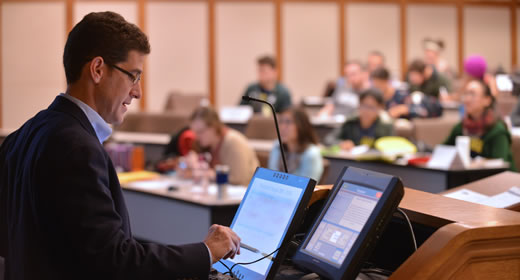
On June 6, Brian Jacob spoke with Dustin Dwyer of Michigan Radio about recent research that explores whether Michigan's Priority and Focus schools have benefitted from reforms implemented in 2012. The work is published in “Differentiated accountability and education production: Evidence from NCLB waivers,” an NBER working paper Jacob co-authored with former Education Policy Initiative Postdoctoral Fellow Steven Hemelt.
The paper explores outcomes for two groups of underperforming Michigan schools--the lowest achieving schools and the schools with the largest achievement gaps between high-performing and low-performing students. Five years ago, both of these groups implemented a number of reforms to improve student outcomes, including creating new teaching strategies and hiring new school leaders.
Jacob and Hemelt analyzed a number of possible areas of change--including student achievement on standardized tests, teacher staffing levels, and student enrollment--comparing performance changes at the underperforming schools that implemented reforms with performance changes at comparable schools that just missed the qualifying threshold.
Their finding? That the reforms produced no significant impact.
According to the article, “Jacob said the problem may be that Michigan had weak implementation of its reform efforts. If true, the lesson he says isn't to institute a whole new set of reforms. It's just to stick with a plan and see it through.”
The authors argue that their findings should “serve as a cautionary tale for the capacity of the accountability provisions embedded in the recent reauthorization of NCLB, the Every Student Succeeds Act (ESSA), to meaningfully improve student and school outcomes.”
Brian Jacob is the Walter H. Annenberg Professor of Public Policy at the Gerald R. Ford School of Public Policy and a professor of education and economics--all at the University of Michigan. He is co-founder and co-director of the Ford School's Education Policy Initiative, which engages in applied, policy-relevant research designed to improve educational outcomes and reduce disparities.